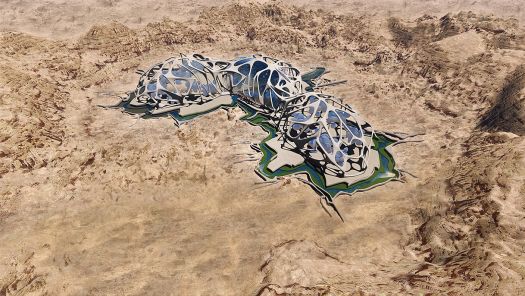Student in top 10 for Mars City Design competition
3 May 2016
Architecture student's Martian designs impress judges
A MANCHESTER School of Architecture student has been named a finalist in an international competition to design a habitat on Mars.
Karan Gandhi, currently studying an MA Architecture and Urbanism, came ninth overall and in second place in the Architecture category of the Mars City Design competition.
The Mars City Design competition is an urban design and innovation platform that brings together innovators in art, architecture, science and technology from around the world to develop ideas and designs that will one day be the blueprint for sustainable cities on Mars. The competition identifies ‘creators of a future history’ as the ultimate aim for the project is to one day make these blueprints a reality.
Karan said: “I have always been enthusiastic about space programs and developing planetary technologies. Before I took part in this competition, I was unsure if architecture and space exploration could possibly have any connection.”
Passport to Mars
After presenting his project at the London Space Research Conference Programme 2016, Karan’s design titled ‘Neurosynthesis’ impressed the creative visionaries that made up the judging panel which included international architects, NASA scientists and engineers, filmmakers and urban planners. Karan scored 55 out of 90 points for his designs resulting in a position in the global top ten.
On his inspiration for his design which included a closed river system, ambulatory housing, and an artificial Martian waterfall, Karan said: “I wanted a city that was architecturally aesthetic but scientifically viable at the same time. The surface of Mars has craters, irregular in shape and size, due to the amount of asteroid hits it receives. This texture appeared to me as an intelligent arrangement of nodes and connections in the celestial entity which resembled the ramified pattern of neurons in the human brain.”
Eamonn Canniffe, Principal Lecturer in MA Architecture and Urbanism, said: “Karan’s proposal clearly impressed the judges with the way he addressed the totality of urban settlement on Mars, both from a technical view in terms of inhabiting such a hostile planet, and from a creative perspective in designing an enjoyable environment in which to live. His fellow students and I are eagerly anticipating the results from the next stage of development of his project.”
As well as being given a Martian passport, Karan has also been invited to Los Angeles where his designs will contribute to further research and development at the University of Southern California with guidance from NASA in July.



